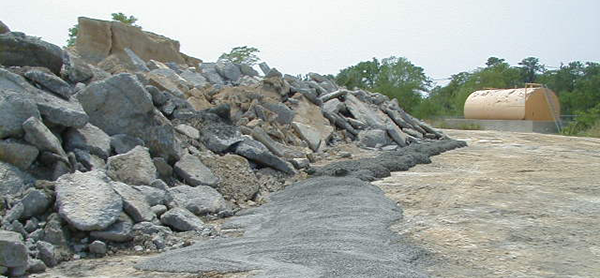I get the question on is concrete hazardous waste a lot, and while the answer seems pretty clear to me, for some reason, it keeps coming up. Let's take the question of is concrete a hazardous waste, or the hazardous nature of concrete, one step at a time.
First, let's consider what is waste. Wikipedia calls it "unwanted or useless materials". The International Basel Convention regarding waste identifies waste thusly: "Wastes are materials that are not prime products (that is products produced for the market) for which the generator has no further use in terms of his/her own purposes of production, transformation or consumption, and of which he/she wants to dispose."
An important idea here - the material has no further use.
The USEPA defines a waste as “discarded material that is not otherwise excluded from definition.” So, it must be a discarded material. It seems like “no further use” and “discarded” are pretty important concepts in whether or not something is a waste.
So on that basis alone, is concrete a waste? NO. Concrete is a building material, and if used for its originally intended purpose, it is not a waste material at all. Since it is not a waste first and foremost, it cannot be a hazardous waste by definition.
So the question of is concrete hazardous waste is clearly no. However, can concrete be considered hazardous?

Any material, even when used in its intended purpose, may be considered "hazardous" due to its inherent nature. This is where Material Safety Data Sheets come in to be used as a tool to identify the potentially hazardous nature of a material. But having an MSDS does not indicate whether a material is a hazardous waste or not, but merely if it is hazardous. Concrete has an MSDS due to it’s potentially corrosive nature (high pH) and the need to take proper precautions when placing concrete on a jobsite. Hazardous? Maybe. But hazardous waste? No.
That is, admittedly, a bit misleading of an answer.
When people ask is concrete hazardous waste, they aren't asking about fresh concrete, they’re usually talking about excess concrete materials. Materials like concrete not used at the jobsite and returned to the plant, fine concrete materials from concrete mixer truck washout, process water from concrete washing and production activities, concrete residue on the ground at a concrete plant, etc. So, is that concrete hazardous waste? That’s a bit more of a tricky answer.
Let’s start at the beginning. Are the above-mentioned excess concrete materials a waste? For example, suppose excess concrete material is re-shipped out to another job. Not a waste. What if that excess concrete were used to make blocks at the plant, or recycled through a reclaimer? Not waste in either of those cases. Fine concrete materials from mixer washout? Process water? What if they were constructively recycled? You guessed it - not a waste.
So you can see, what is done with the excess concrete material is very important. If you can recycle concrete in any way, shape, or form, then it’s not a waste. Dispose of it, discard it, have no further use for it, then YES, it would be considered a waste.
But if it's a waste, could it then be considered a hazardous waste? Maybe.
The USEPA defines hazardous wastes in several ways, one of them being whether or not it is what is called a "characteristic" hazardous waste. Does the waste meet certain stated characteristics? If it does, then it is a hazardous waste. One characteristic that is very applicable is the corrosivity mentioned above, the high pH, which you might find from excess unhardened concrete, concrete fine materials, process water, etc. According to the USEPA, if that material has a pH greater than 12.5, it is by nature a corrosive material, and by default, a hazardous waste. So you see, is concrete hazardous waste doesn’t have a simple answer. It depends upon what happens to the excess materials, how they are handled, and their ultimate end disposition.
By its nature alone, concrete is not waste, and certainly not hazardous waste. It’s a construction product - and a very good one at that due to its many uses, durability, resiliency, sustainability, and environmental benefits. If not managed or disposed of properly, then concrete or concrete materials could be a waste, and perhaps even a hazardous waste. It all comes down to its use and disposition.
The best thing to do? Recycle and reuse. WASTE nothing. And help change the terminology of the industry (and all industries), and do not refer to materials that are not waste as waste. If the material has further life to it, whether it's to be used as crushed concrete, or run though a reclaimer, or poured as block, then concrete is not a waste at all. I hear it a lot for used oil vs waste oil, for example. Understand the difference, and call these materials what they truly are.
If you're a concrete producer and struggling to handle your excess concrete, click here to contact our experts or give us a call at 609-693-8301 to discuss how we can help your operation today.

